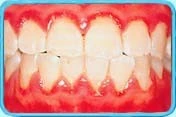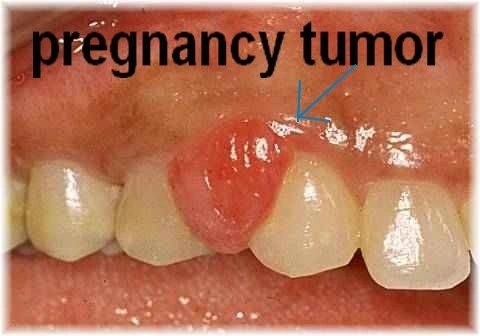Pregnancy Gingivitis
What is pregnancy gingivitis?
Gingivitis occurs when plaque, which contains bacteria, builds up on teeth and produces toxins that irritate the gums. If you have bleeding, red, puffy, sore or inflamed gums, it’s probably gingivitis. (From dentalcare.com – “What is Gingivitis?)
Pregnancy gingivitis is caused by a rise in the hormone progesterone which can contribute to an increase in the flow of blood to gum tissues making them sensitive, swollen and more likely to bleed when you brush and floss. These hormonal changes can make it easier for certain gingivitis-causing bacteria to grow and can make gum tissues more tender. While pregnancy gingivitis can occur anytime between the second and eighth month, it’s usually most severe during the second trimester.
An Example of Pregnancy Gingivitis
Occasionally a red lump or “overgrowth” develops on the gums – usually near the upper front teeth. These are called pregnancy tumors and they are not cancerous or contagious. If you have a pregnancy tumor you should contact your dentist, but most of these lumps disappear after the baby is born.
Between 60% and 70% of women experience pregnancy gingivitis
Why is it important to manage pregnancy gingivitis?
Managing pregnancy gingivitis is important so that it doesn’t progress into a more serious form of gum disease called periodontitis. Periodontitis can lead to serious oral health problems that could require surgery or lead to tooth loss. Your overall health – as well as the health of your baby - can be affected by the health of your teeth and gums. Some research has even shown a connection between poor gum health and premature delivery.
What can I do to prevent pregnancy gingivitis?
Controlling plaque is the most important thing you can do to prevent problems with pregnancy gingivitis. A strict home care routine of proper and meticulous plaque removal should start even before you are pregnant. Not all oral care products are the same, so be sure to choose a toothpaste and mouthwash designed to treat plaque and gingivitis. Also try a soft power brush to make plaque removal easier.
Oral care tips for a healthy pregancy
- Don’t skip regular check-ups at your dental office
- Use a soft power toothbrush and floss gently to prevent injury to delicate gum tissues
- Use an antigingivitis/antiplaque toothpaste twice a day and floss daily
- Rinse with an alcohol-free antigingivitis/antiplaque mouthwash
- Rinse your mouth after a bout with morning sickness to keep acids from affecting your teeth and gums
- Follow a healthy diet including plenty of calcium, phosphorus, protein, and vitamins A, C and D. Talk to your obstetrician about the need for vitamin supplements.
CONGRATULATIONS!
While you are enjoying this exciting time of your life, remember that giving special attention to your teeth and gums will pay off down the road - - and set a great example for your new child!
*bag is only available through dental professionals
SHARE





